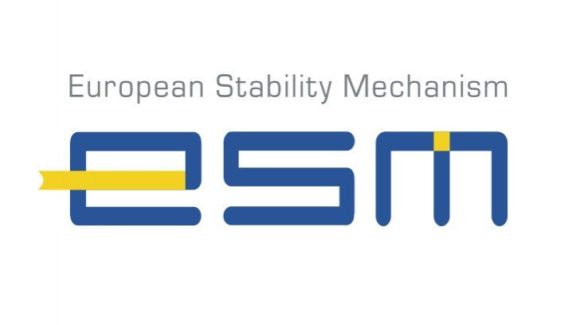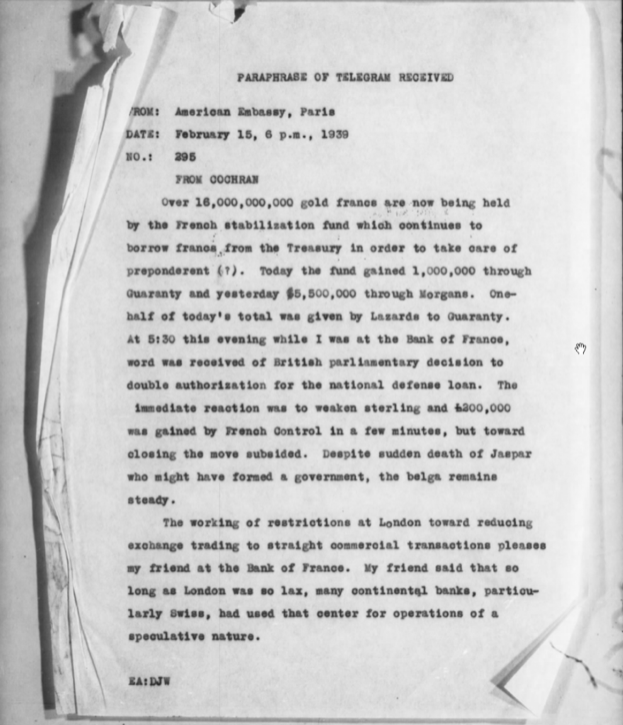
27 January 2018
The following document is a de-classified correspondence between the US State Department and their man called Cochran, in Europe, reporting back on financial and political moves by Europe in 1939 just before war.
It would appear all nations were tied in one respect or another to the will of the Bank for International Settlements, each nation building a stability fund or Fondi for survival.
Today we see the European Stability Mechanism at play[1] not dissimilar to the position in 1939 when all nations were running hand over foot for a Bank for International Settlements hand out of credit, at an interest rate high enough to ensure governments spend more time building the fund than administrating the nation, leading to a position domestically, whereby all nations are left at the mercy of the corporate network that issues forth austerity for the beleaguered creditor/taxpayer also known as ‘You’.
If only the similarities ended there, in 1939 the banking regulations in the City were lax enough to ensure all players needed the privately controlled City of London to speculate, just to keep the stability funds alive, the exact position the City is still enjoying today…. rehypothecation anyone….
With Israel and Iran posturing like demented cocks perhaps the parallel between the state of play in 1939 with that of today, is tantamount to being ‘the reality’.
What is war if not the failed banking fraternity killing the creditor people before they demand to be compensated for the fraud the banks have carried out with their cash in the bank?
The de-classified document :
Note
[1] The European Stability Mechanism Explained
“TREATY ESTABLISHING THE EUROPEAN STABILITY MECHANISM
BETWEEN THE KINGDOM OF BELGIUM, THE FEDERAL REPUBLIC OF GERMANY, THE REPUBLIC OF ESTONIA, IRELAND, THE HELLENIC REPUBLIC, THE KINGDOM OF SPAIN, THE FRENCH REPUBLIC, THE ITALIAN REPUBLIC, THE REPUBLIC OF CYPRUS, THE GRAND DUCHY OF LUXEMBOURG, MALTA, THE KINGDOM OF THE NETHERLANDS, THE REPUBLIC OF AUSTRIA, THE PORTUGUESE REPUBLIC, THE REPUBLIC OF SLOVENIA, THE SLOVAK REPUBLIC AND THE REPUBLIC OF FINLAND”
Members of parliament all have access to the draft legislation.
WHEREAS :
(1) The European Council agreed on 17 December 2010 on the need for euro area Member States to establish a permanent stability mechanism. This European Stability Mechanism (“ESM”) will assume the tasks currently fulfilled by the European Financial Stability Facility (“EFSF”) and the European Financial Stabilisation Mechanism (“EFSM”) in providing, where needed, financial assistance to euro area Member States.
(2) On 25 March 2011, the European Council adopted Decision 2011/199/EU amending Article 136 of the Treaty on the Functioning of the European Union with regard to a stability mechanism for Member States whose currency is the euro1 adding the following paragraph to Article 136 :
“The Member States whose currency is the euro may establish a stability mechanism to be activated if indispensable to safeguard the stability of the euro area as a whole. The granting of any required financial assistance under the mechanism will be made subject to strict conditionality.”
(3) With a view to increasing the effectiveness of the financial assistance and to prevent the risk of financial contagion, the Heads of State or Government of the Member States whose currency is the euro agreed on 21 July 2011 to “increase [the] flexibility [of the ESM] linked to appropriate conditionality.”
“The authorised capital stock shall be 700 billion Euros.”
ARTICLE 8
Authorised capital stock
1. The authorised capital stock shall be EUR 700 000 million.
Q. Why 700 billion? Where did that number come from, and by whom and on what basis was it calculated?
“ESM members hereby irrevocably and unconditionally undertake to pay on demand any capital call made on them …….. Within seven days of receipt of such demand.”
ESM Members hereby irrevocably and unconditionally undertake to pay on demand any capital call made on them by the Managing Director pursuant to this paragraph, such demand to be paid within seven days of receipt.
Q. Nothing really. That part is clear. If the ESM needs money we have seven days to pay. Taking normal bank processing times into account that means we have 4 days to write a cheque.
But what does irrevocably and unconditionally mean?
What if we have a new parliament, one that doesn’t what to transfer money to the ESM? Do we have to pay anyway?
“The board of governors may decide to change the authorised capital and amend Article 8…..Accordingly.”
ARTICLE 10
Changes in authorised capital stock
1. The Board of Governors shall review regularly and at least every five years the maximum lending volume and the adequacy of the authorised capital stock of the ESM. It may decide to change the authorised capital stock and amend Article 8 and Annex II accordingly.
Q. Pardon me? 700 billion is just the beginning. The ESM can stock up the fund as much as it wants to, any time it wants to, and we would then be required, under Article 9, to irrevocably and unconditionally pay up?
“The ESM shall have full legal capacity to institute legal proceedings. The ESM, its property, funding and assets shall enjoy immunity from every form of judicial process. “
ARTICLE 32
Legal status, privileges and immunities
1. To enable the ESM to fulfil its purpose, the legal status and the privileges and immunities set out in this Article shall be accorded to the ESM in the territory of each ESM Member. The ESM shall endeavour to obtain recognition of its legal status and of its privileges and immunities in other territories in which it performs functions or holds assets.
2. The ESM shall have full legal personality; it shall have full legal capacity to:
(a) acquire and dispose of movable and immovable property;
(b) contract;
(c) be a party to legal proceedings; and
(d) enter into a headquarter agreement and/or protocols as necessary for ensuring that its legal status and its privileges and immunities are recognised and enforced.
3. The ESM, its property, funding and assets, wherever located and by whomsoever held, shall enjoy immunity from every form of judicial process except to the extent that the ESM expressly waives its immunity for the purpose of any proceedings or by the terms of any contract, including the documentation of the funding instruments.
Q. So the ESM programme can sue us, but we can’t challenge it in court?
“The property, funding and assets of the ESM shall be immune from search, requisition, confiscation, expropriation or any other form of seizure, taking or foreclosure by executive judicial administrative or legislative action.”
4. The property, funding and assets of the ESM shall, wherever located and by whomsoever held, be immune from search, requisition, confiscation, expropriation or any other form of seizure, taking or foreclosure by executive, judicial, administrative or legislative action.
Q. Immune from judicial action was covered in the last point. But this means neither our governments nor our legislature nor any of our democratic laws have any effect on the ESM organisation? That’s a pretty powerful treaty.
“Governors, alternate governors, directors, alternate directors, the managing director and staff members shall be immune from legal process with respect to acts performed by them …..and shall enjoy inviolability in respect to their official papers and documents. “
ARTICLE 35
Immunities of persons
1. In the interest of the ESM, the Chairperson of the Board of Governors, Governors, alternate Governors, Directors, alternate Directors, as well as the Managing Director and other staff members shall be immune from legal proceedings with respect to acts performed by them in their official capacity and shall enjoy inviolability in respect of their official papers and documents.
Q. So anyone involved in the ESM is off the hook? They can’t be held accountable for anything? And does the inviolability of their papers mean we can’t destroy them, or that we won’t even be allowed to see what’s been written?
…….Establishes a new intergovernmental organisation to which we are required to transfer unlimited assets within 7 days if it so requests. An organisation that can sue us but is immune from all forms of prosecution, and whose managers enjoy the same immunity? There are no independent reviewers and no existing laws apply? Governments cannot take action against it?
Europe’s national budgets in the hands of the one single unelected intergovernmental organisation?
Is that the future of Europe? Is that the new EU? A Europe devoid of sovereign democracies?
European Stability Mechanism 05-tesm2.en12
Further Study
In Profile : Emergency Banking Act, March 9, 1933
Comparisons between Bank for International Settlements, (BIS) guidelines pre WWII, with those of today
The City And Re-Hypothecation, David Cameron And Veto
